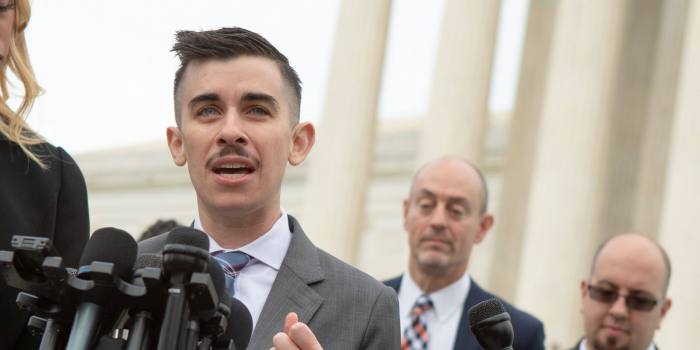Governor Tate Reeves of Mississippi on March 11 signed legislation banning transgender athletes from participating in sports, marking the first anti-trans sports bill to get signed into law this year.
The legislation bans transgender girls and women — as well as some non-binary athletes — from playing in accordance with their gender identity in schools or college athletics. It is one of numerous bills of its kind floating around State Legislatures across the country at a time when conservatives are increasingly peddling transphobia under the guise of “women’s rights.”
The law will undoubtedly draw stiff legal challenges and public opposition from across the nation — including major corporations — less than a year after the Supreme Court took aim at anti-LGBTQ discrimination and just months after President Joe Biden signed executive orders reaffirming protections on the basis of sexual orientation and gender identity.
Mississippi became the second state, following Idaho, to enact such a law — but Chief US District Judge for Idaho David C. Nye subsequently blocked the bill in Idaho shortly after it was passed last March.
Notably, the ban in Mississippi includes NCAA athletics, setting the stage for boycotts and broad nationwide resistance. More than 500 college athletes have already demanded the NCAA withdraw championship competitions from any state imposing bans on trans athletes.
The legislation cleared both chambers of the State Legislature this year with bipartisan support — even as Democratic lawmakers refuse to explain themselves. Multiple Mississippi Democrats contacted by Gay City News ignored requests for comment on their votes.
South Dakota’s State Legislature followed suit and passed their own version of the bill at the conclusion of their legislative session. Governor Kristi Noem of South Dakota has vowed to sign the bill.
In the meantime, advocates are directing their outrage towards lawmakers and the governor in Mississippi.
“This bill will hurt Mississippi’s economy, but most upsetting, it will hurt transgender youth in Mississippi,” Chase Strangio, deputy director for Trans Justice with the ACLU’s LGBTQ and HIV Project, said in a written statement. “We call on the Biden administration to ensure our federal civil rights laws are fully enforced — including those that protect transgender youth from discrimination in schools. Other states should know that passing a bill like this will come with real consequences. Just like it was never about restrooms, this bill is not about sports.”
Strangio added, “It’s about pushing trans people out of public life. This investment in targeting trans kids and scrutinizing the bodies of women and girl athletes will also harm all young people in sport and create barriers to participation in activities that are invaluable to the health and well-being of our youth.”
The National Center for Transgender Equality (NCTE) also slammed the new law.
“To the transgender students in Mississippi who have been attacked by this legislation, you belong, we see you and we will do everything we can to support you,” Mara Keisling, NCTE’s executive director, said in a written statement. “Governor Reeves’ actions today are unjust and discriminatory. He has targeted transgender kids and added to their burden, opening them up to more harassment, abuse and violence. Transgender students should be allowed to live their lives without fear and out of the shadows. Reeves has done Mississippi students real harm.”
After many Republicans became fixated on banning transgender and non-binary individuals from using bathrooms in accordance with their gender identity, they have recently set their sights on pulling transgender athletes off the playing field.
Advocates who have worked on the ground in states pushing anti-trans sports bills have expressed to Gay City News that the anti-LGBTQ Alliance Defending Freedom (ADF), a notorious far-right legal group, has been leading the push behind those bills. When the Idaho bill passed, Kathy Griesmyer of the ACLU told Gay City News that ADF spearheaded the lobbying effort for that bill, along with the Catholic Church and the Madison Liberty Institute, which is described as an “independent research and educational organization whose mission is to promote the founding principles of the American republic, free-market solutions, and ‘secure the blessings of liberty to ourselves and posterity.’”
The center of the sports issue, however, has not been Idaho or South Dakota or Mississippi. Transphobes have continued to point to former Connecticut high school student-athletes Andraya Yearwood and Terry Miller, who were targeted by an ADF lawsuit asserting that cisgender student-athletes saw their “dreams and goals” get squashed because they had to face trans opponents — despite the fact that Miller and Yearwood both won and lost competitions, effectively debunking theories insisting they had any unfair advantage.

The right has insisted that the inclusion of transgender athletes flies in the face of Title IX — the landmark 1972 law banning sex discrimination in federally-funded athletic and academic programs. On the contrary, the Connecticut Interscholastic Athletic Conference, which allows transgender student-athletes in the state to participate in accordance with their gender identity, has asserted that Title IX should help protect trans athletes’ rights to participate in sports. The Biden administration’s executive order on “Preventing and Combating Discrimination on the Basis of Gender Identity or Sexual Orientation” states that “children should be able to learn without worrying about whether they will be denied access to the restroom, the locker room, or school sports.”
An evident pattern at play is that the athletes facing the brunt of attacks, including Yearwood, Miller, and Olympic track star Caster Semenya of South Africa, have been Black. While Semenya is not transgender, she has faced years of racism, invasive sex testing, and discriminatory regulations specifically targeting the competitions she participates in.
Semenya has stressed that her testosterone levels are natural, but the World Athletics imposed regulations requiring her to take medication to lower her testosterone levels in order to participate. The Office of the United Nations High Commissioner for Human Rights, which is opposed to any such testosterone rules, has blasted the regulations.
In the face of such discriminatory attacks, however, athletes have refused to back down. During an interview with Gay City News in 2019, Miller stood up for all athletes who are simply looking for an opportunity to play sports.
“I want everyone to be comfortable being themselves,” Miller said. “Don’t be scared to participate in sports, because we have rights, too.”



































